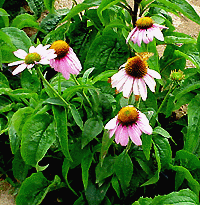Field Day Offers Advice On Pumpkins, Tomatoes, Medicinal Herbs, & More
Field Day Offers Advice On Pumpkins, Tomatoes, Medicinal Herbs, & More

Growing crops is not a static process – it's dynamic and ever-changing. The type of pumpkin you grew ten years ago may not be the best for fighting off disease today. The tomato you used to swear by may not taste as good as a newer variety. And there may be new kinds of crops you never thought of that can offer you real profit potential.
That's the value of the agricultural field day – it gives you the chance to see first-hand the latest crop varieties and advances in plant science.
A UK-sponsored field day in Lexington on Wednesday, August 11 is for producers interested in fruits and vegetables. It will start at 6:00 p.m. at UK's Horticulture Research Farm at the corner of Nicholasville Road and Man-O-War, across from Lowes and Walmart.
"Our field day on August 11 will give commercial producers information on pumpkins, seedless watermelons, green fleshed melons, tomatoes, apples, strawberries, and more," said John Strang, horticulture specialist with the UK Cooperative Extension Service. "Producers can talk to our UK College of Agriculture researchers and specialists, ask them questions, and even bring in samples of problems for identification and recommendations."
Strang is evaluating powdery mildew-tolerant pumpkin varieties for production and fruit quality characteristics.
"The company that produced one of the more effective powdery mildew fungicides has stopped marketing the product," said Strang. "If we can find varieties that have good tolerance to powdery mildew and yield high-quality pumpkins, this can make production a little easier for Kentucky growers."
Commercial tomato growers attending the August 11 field day will be updated on research into varieties that are best suited for Kentucky growing conditions.
"We've been conducting trials to find out which variety might be considered the ‘Kentucky' tomato for commercial growers in the state – the one that grows the best, looks the best, and tastes the best," said Brent Rowell, UK horticulture specialist. "We'll be conducting taste tests at a major supermarket later in August to gather additional information to pass along to producers."
One of the more unique crops featured at the horticulture field day is the landscape perennial called echinacea (pronounced ek-in-AY-shuh). "A lot of people know echinacea as a landscape plant with an attractive flower, but it's also an herb crop grown for medicinal purposes," said Bob Anderson, Extension floriculture specialist. "The active ingredients in echinacea are extracted from the dried plant and used in over-the- counter cold remedies. One of our graduate students will be sharing information with producers about general production and yield."
Producers attending the field day also will get information on genetically-engineered crops, drip irrigation, insect control, and disease control of several crop varieties.
"This field day is for producers already growing horticultural crops, or for those thinking about trying horticultural crops," said Anderson. "It's a chance to stay abreast of new varieties and techniques, and to exchange information with other growers."